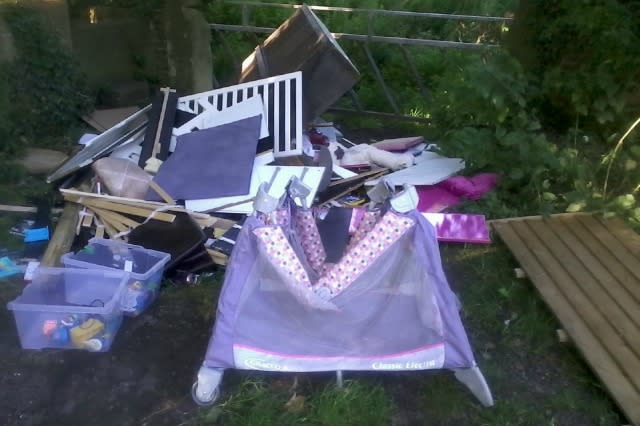Woman who paid man to take rubbish away is fined for fly-tipping

Kelly Holland, a 38-year-old mum of five from Allerton in Derby, must have felt a sense of achievement after having a clear out, and paying a man to take away unwanted furniture and rubbish. However, that feeling won't have lasted long, because after the man she paid dumped the junk by the side of the road, she ended up getting prosecuted for fly-tipping.
The Nottingham Post reported that Kelly had advertised on Facebook for help getting rid of the items - including a travel cot, a wardrobe, a bed, and a bag of DVDs. A man with a van showed up, and she paid him £40 to take it all away
However, unbeknownst to her, he then drove it to the Nottinghamshire village of Strelley, and dumped it by the side of the road.
The Daily Mail reported that council staff dug through the rubbish, and found one of Kelly's wage slips. They tracked her down and she was unable to tell them the name of the man she had paid to dispose of the rubbish, or whether he had a Waste Disposal Licence, so they took her to court.
Kelly admitted breaching the Environmental Protection Act, by failing to ensure the man she paid was an 'authorised person'. She was apparently supposed to have asked him for paperwork saying the items would be properly disposed of.
She had to pay £427 in clean-up costs, plus a fine of £80 and a surcharge of £20. She also has a criminal record.
Is this fair?
On the one hand, fly-tipping is a major problem in the UK. The most recent figures - out at the end of last year - showed there were 900,000 incidents of fly-tipping in the previous year - up 5.6% from a year earlier. Clearing up all of this rubbish cost local authorities almost £50 million - up 11% from a year earlier.
Arguably, where a council can identify the individual who has dumped the waste, they are duty-bound to take them to court to recover the cost of the clear up. If they can identify the individual who the waste belongs to - and they can't point the finger at the person who chucked it out of the van - then somebody still needs to pay.
On the other hand, council changes have exacerbated waste problems - and arguably contributed to the increase in fly-tipping in the first place. They are making it far more difficult for items to be thrown away - with less regular refuse collections and strict rules about the use of council tips. They also charge through the nose for bulk uplifts. Sheffield, for example, will charge £61.20 if you want them to take away ten or more items. Lambeth, meanwhile, charges £21 for the first four items, and £5.25 for each additional one - so that ten items would cost £52.50. And a number of councils will restrict the number of bulk uplifts they will do each year. It means more people being forced to rely on private contractors - making them vulnerable to the sort of issues Kelly has faced.
In addition, the cost of taking fly-tippers to court is far more than ever gets paid in clean ups. The government figures show that over the course of a year, fly-tippers were made to pay a total of £151,000. The estimated cost of taking all these cases through the legal system was £17.6 million.
Meanwhile, as Kelly's lawyer pointed out, she had paid the man to take the rubbish away in good faith. She didn't know about the paperwork she was supposed to have asked for, and she made a genuine mistake - for which she is facing a hefty punishment.
The government can argue that this helps raise awareness of our duties as homeowners. However, this will come as scant consolation to Kelly, who is going to think twice before bothering with a clear out again.
What do you think? Is this fair, or has Kelly been needlessly taken to the cleaners? Let us know in the comments.





